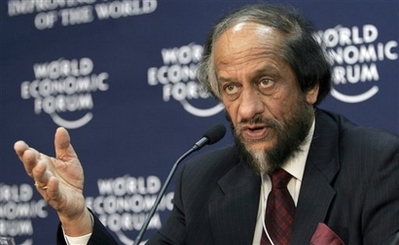IPCC urges more investment from business on climate
Updated: 2008-01-24 06:39
DAVOS, Switzerland - The UN Intergovernmental Panel on Climate Change (IPCC) Chairman Rajendra Pachauri urged the business circle on Wednesday to increase investment in research and technology, by which the world can "minimize" greenhouse gas emissions.
 Chairman of the Intergovernmental Panel on Climate Change Rajendra Pachauri gestures while speaking during a media conference at the World Economic Forum in Davos, Switzerland, Wednesday Jan. 23, 2008. Amid a backdrop of concern over the health of the global economy, some 2,500 business and political leaders gathered Wednesday for the annual World Economic Forum, with a sober assessment of market turmoil at the top of the agenda. [Agencies] |
"If the world is moving towards a low carbon future then those companies that are going to be ahead of the others at arriving at low-carbon solutions will really benefit most," he told a press conference at the ongoing World Economic Forum (WEF) Annual Meeting.
The business groups should focus on efforts needed not only on how to adapt to climate change, but also on taking immediate actions to mitigate the effects of climate change, said Pachauri. "This is the message Davos must accept."
He pointed out that the developing countries have attached more importance to emissions reduction and the developed countries should move to develop new technologies which will benefit the control of gas emissions.
In this way, the developed countries could help developing countries, which usually use technology that has been proven and used in developed countries, he said.
Pachauri said the Group of Eight summit to be held later this year in Japan is important to the implementation of the so-called Bali Roadmap reached last December during the UN climate change conference in Indonesia.
Pachauri, whose IPCC shared the Nobel Peace Prize for 2007 with former US Vice President Al Gore, expressed his hope that the most developed countries would fulfill their commitments to the roadmap.
The Bali Roadmap, agreed by over 180 countries, includes a clear agenda for the key issues to be negotiated up to 2009, including action for adapting to the negative consequences of climate change, ways to reduce greenhouse gas emissions, ways to deploy climate-friendly technologies and financing both adaptation and mitigation measures.
The five-day WEF annual meeting started in this Swiss ski resort on Wednesday under the principal theme of "the Power of Collaborative Innovation," bringing together the world's political and business elite.
|
|
|
||
|
||
|
|
|
|